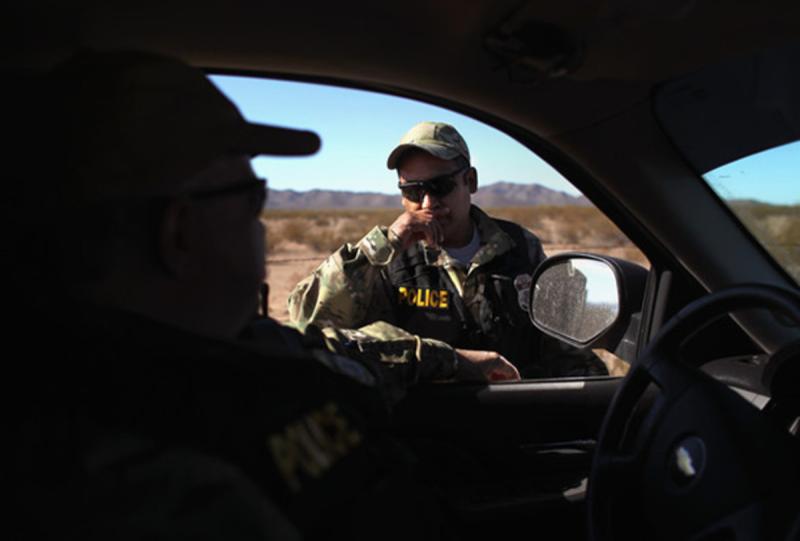Native tracking unit the Shadow Wolves could be expanding
By: Indian Country Today



The elite unit has tracked smugglers across the 2.8 million acres of the Tohono O'odham Nation in southern Arizona and a stretch of land bordering Mexico Author: The Associated Press
The Shadow Wolves are the Department of Homeland Security's only Native American tracking unit. (Photo courtesy of U.S. Immigration and Customs Enforcement)
The elite unit has tracked smugglers across the 2.8 million acres of the Tohono O'odham Nation in southern Arizona and a stretch of land bordering Mexico
Clara Migoya
Arizona Republic
PHOENIX — The Shadow Wolves unit, Homeland Security's only Native specialized tracking team, is ready for a change after nearly 50 years of patrolling the Arizona desert.
Bills that seek to strengthen and expand the Shadow Wolves' authority were approved unanimously by the U.S. Senate Committee on Homeland Security in the past month.
If the bills move forward, they will allow Homeland Security to reclassify the Shadow Wolves from tactical enforcement officers to special agents and expand the program to other tribal jurisdictions.
Since 1974, the elite unit has tracked smugglers across the 2.8 million acres of the Tohono O'odham Nation in southern Arizona and the 76-mile stretch of land bordering Mexico.
The unit is world-renowned for its skill for "cutting sign," or reading physical evidence in the landscape: spotting a weft in the desert thicket, the edges of a mark in the sand, or the inside color of a broken twig.
As part of Immigration and Customs Enforcement task forces in the U.S. Department of Homeland Security, Shadow Wolves are a key component in interdiction and investigative efforts that lead to arrests and seizure of illegal drugs and guns.
They took part in an investigation that led to the capture and conviction of 18 members of the Sinaloa Cartel near the Tohono O'odham Nation in 2019.
As of this year, the unit is composed of nine citizens from tribes including the Tohono O'odham, Blackfeet, Sioux and Navajo.
If the Shadow Wolves Enhancement Act moves forward through the House and Senate, it will further a strategy to retain and recruit agents in the Tohono O'odham Nation and expand the program to other tribal nations near the U.S. international borders in the north and south.
The reclassification to special agents would mean current and future Shadow Wolves would go through a criminal investigator training program and special agent training.
The upgrade also would help counter technology advances used by criminal organizations and improve collaboration in multijurisdictional investigations. It would provide new tools to agents while preserving the legacy of the unit.
The bill was first introduced in March 2020 and backed unanimously by the Tohono O'odham Legislative Council the same month. Then it was reintroduced in July, adding the expansion of the program to other tribal jurisdictions.
U.S. Sen. Kyrsten Sinema, D-Ariz., who sits on the Senate Committee on Homeland Security, is a primary sponsor of the bill.
"Reclassifying Shadow Wolves as special agents entrusts them with more authority to investigate illegal border crossings, patrol the border, and keep Arizona families safe and secure," Sinema said.
The Shadow Wolves are the Department of Homeland Security's only Native American tracking unit. (Photo courtesy of U.S. Immigration and Customs Enforcement)
The Tohono O'odham have lived in the Sonoran Desert for millennia. In the mid-19th century, when international boundaries were redrawn with the Gadsden Purchase, their land and people were split.
Border enforcement transformed life for tribal citizens in Arizona, limiting their own cross-border movement to conduct ceremonies or visit relatives south of the international border, and eventually placing them in the midst of the fight against drug trafficking and irregular migration at the U.S.-Mexico border.
The Tohono O'odham Nation spends about $3 million in tribal revenue on border security operations, according to 2019 testimony given to Congress by the tribe's former chairman. The tribe also investigates and funds autopsies for the deaths of dozens of migrants who perish trying to cross the reservation undetected.
The seed for the Shadow Wolves was sown in 1974 when the Tohono O'odham Nation allowed the now-dissolved U.S. Custom Services to build an office in Sells. The agency, in turn, hired 25 tribal citizens as patrol officers. About 10 years later, the unit gained its unique name.
Verlon Jose, governor of the Traditional Tohono O'odham Leaders of Mexico and former vice chairman of the Nation, said Shadow Wolves are "protectors" and "warriors" with a unique personal commitment in what they do.
The men and women who commit to track smugglers and stop the flow of drugs have a vested interest in their community, he said.
In the late 1960s, Mexico was the major source of heroin in the U.S., and by the 1970s Mexican-based traffickers controlled three-fourths of the market. The Nation was seeing large amounts of drugs moving through the community.
"It was truly about protecting the people," Jose said, pointing out that the international border placed them at the forefront of the trafficking route. "We're on the front lines before anybody else. But in a sense, that is the front line of America."
Although the efforts to expand the program are seen as a way to facilitate collaboration between federal agencies and tribes, the nature of border enforcement in sovereign Native American territory remains complex.
When the Department of Homeland Security was created in the wake of the Sept. 11, 2001, terrorist attacks, the reorganization placed Shadow Wolves under the U.S. Border Patrol.
The federal government failed to consult the Tohono O'odham Nation on such reorganization, violating federal agreements.
Eventually, the unit was reassigned under ICE's Homeland Security Investigations in 2006. By then, the Shadow Wolves program had lost several experienced trackers who stated that Border Patrol's chain of command limited their patrolling grounds and investigative operations.
The number of officers has shrunk from 25 to nine in recent years.
Jose said greater support for the Shadow Wolves program had been delayed because of bureaucracy and the failure of lawmakers to talk to the people on the ground.
Even as the bill aims to expand the Shadow Wolves program to other tribal lands intersecting with U.S. international borders, the tribes themselves have collaborated for years.
Leaders from the Tohono O'odham and Blackfeet nations — the Blackfeet jurisdiction has about 50 miles bordering Canada — have worked together and made visits to learn from each other, Jose said.
But the long-standing presence of Border Patrol agents, internal checkpoints and surveillance equipment on tribal land have created an environment of tension.
The Tohono O'odham Nation cooperates with Homeland Security's operations but opposed then-President Donald Trump's border wall project, as it would further divide O'odham communities and have profound ecological consequences.
With $16 billion from U.S. taxpayers and diverted military funds, the former administration completed 452 miles of the border wall although the 76-mile swath of land between the Nation and Mexico has only a waist-high vehicle barrier.







trolling, taunting, and off-topic comments may be removed at the discretion of group mods. NT members that vote up their own comments or continue to disrupt the conversation risk having all of their comments deleted. please remember to quote the person(s) to whom you are replying to preserve the continuity of this seed.
Over the years the Shadow Wolves have had their resources cut at least two times that I'm aware of and have had bad relations with the BP. They have a proven record and perhaps finally they will get the support that they need and deserve.
They work alone in the vast desert of the southwest in very dangerous situations.
There a multiple stories on some of the missions they undertake and the results. One that stands out to me is in the middle of the night in the vast reaches of the desert a Shadow Wolf had been tracking a gang of drug smugglers and once they camped for the night and went to sleep he crept into their campsite and took all their weapons. When they woke up there he was looking over them with back up he had called in during the middle of the night.
are the cartel members as afraid of the NA's as the republicans are? I see some gray area here that could be exploited to the NA's advantage.
The drug cartels put a $500,000 bounty on the heads of the Shadow Wolves.
The Shadow Wolves must be very effective
take their money, take their guns, destroy their drugs, and stake them up or bury them on the mexican side of the border. ezpz
They are very effective and with new resources and chain of command they could be expanding into new territory.
Sounds like a plan, devan.
They are some, for real, bad-azz MF's.
Yes, they are some real badasses.
Nice!
I've been doing my own tracking, for hunting purposes, since I was in third grade, and have always been fascinated by real tracking experts. This makes me think of one of my favorite sequences and scenes of all movies...
Butch: "You're wasting your time. They can't track us over rock."
Sundance: "Tell that to them."
That was classic.
The Shadow Warriors are definitely some very badass people who deserve all the help and support they can get from DHS!
Agreed, they are and they can be much better if the BP would get the hell out of the way which is changing with the new alignment.
Morning...it is truly remarkable how first nations people have the brilliant skills passed down from one generation to another in the art of tracking.
Here the Kooris are renowned for it as well ..we look at the desert..yep sand and rocks...the Kooris look at it and read it like a book..
Good on the Shadow Wolves..
Having spent some time Kooris when I lived in OZ you are quite correct that they are magnificent trackers and can read the desert like it's a book.
Who better to help patrol the land than those who have lived on it and made their living from it for millennia?
I hope Border Patrol has the sense to work with them, rather than against them. The Tohono O'odham didn't cross the border. The border crossed them.
The BP is not like or wanted by the Tohono O'odham they have created a lot more problems then they have solved with the Tohono O'odham and the Shadow Wolves.
Shooting themselves in the feet. They need to recognize a valuable potential ally when the see one, and then get out of their way.
Yes, they do and if the new arrangement and chain of command take place they will be out of the picture in some ways. The BS they are pulling on the rez will continue to be a big problem. Hopefully, their new status will change that as well.
I hope that they get their funding issues figured out and that their numbers grow. They seem to be more effective than our usual border patrol, and probably since they know the land so well!
Working alone in the vast desert tracing drug dealers is highly dangerous work. There are no backup minutes away.